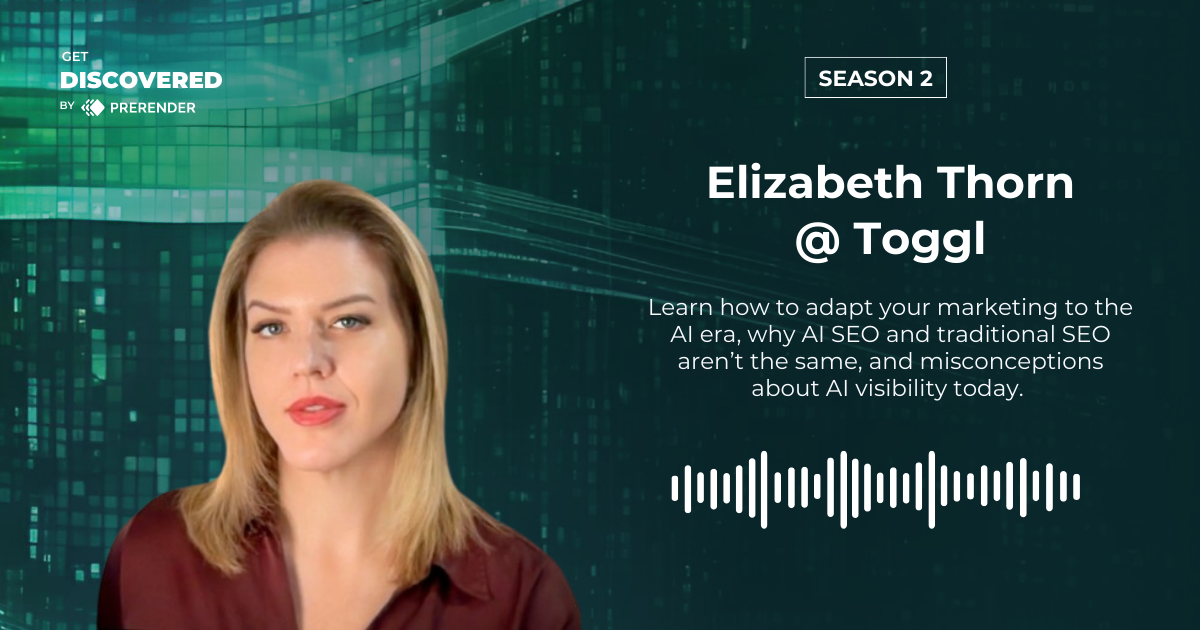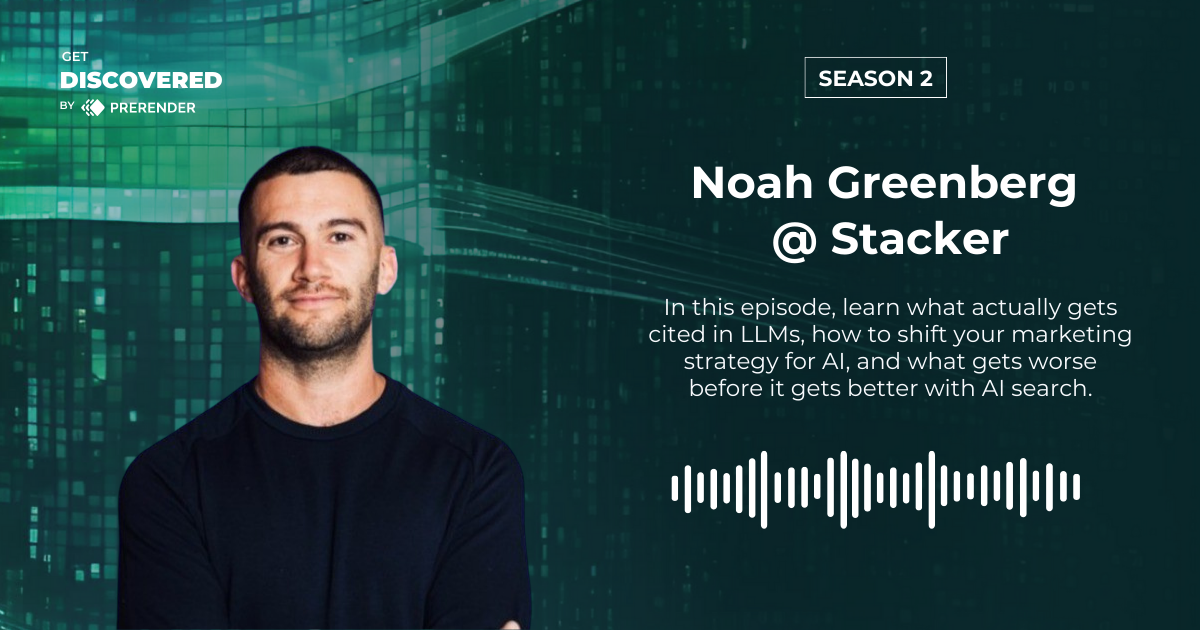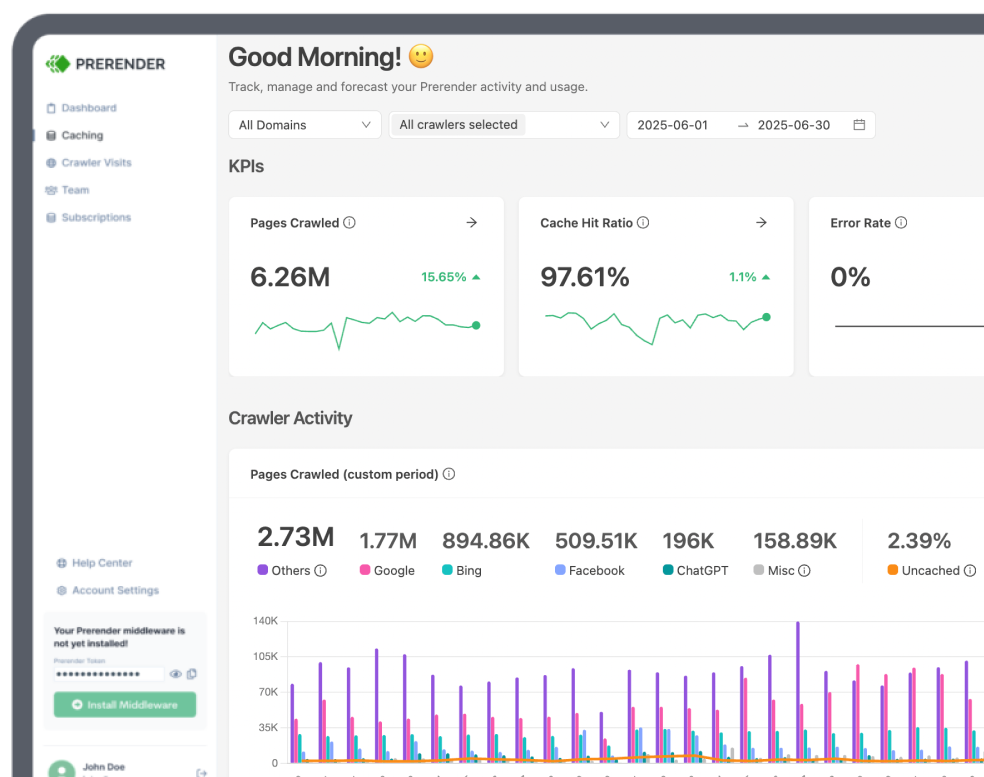We took our Get Discovered podcast to record it live at BrightonSEO, where we chatted with industry leaders from top SaaS companies to explore how they’re adapting. Their insights reveal how AI is redefining SEO strategy, content creation, and visibility in the age of generative search.
Listen to the full episode below, or read on for a summary.
“How Would You Define AI?” Experts Redefine Its Role in Search
AI isn’t new. But the way it’s shaping our online discovery is.
The experts we interviewed offered complementary perspectives, each one with a different, unique answer on how they would define AI. While each guest arrives at a different conclusion, they all share overlapping themes.
AI as a Force for Automation and Efficiency
Klaus-M. Schremser, co-founder of Otterly AI, sees AI as a societal accelerator. A technology that frees people to focus on creativity and strategy by automating routine work.
Further reading: Otterly AI and Prerender.io launch a new partnership.
Similarly, Samy Ben Sadok from Collaborator.pro defines AI as any system that helps automate workflows. It’s not just about chatbots; it’s about time savings, precision, and scalability.
AI as the New Search Interface
Alex Posen from Similarweb calls AI “the new way people search.” As users shift from typing queries into Google to prompting language models, traditional SEO metrics start to lose relevance.
Danielle Escaro from Oncrawl agrees. AI is another step in the ongoing evolution of search, not a replacement.
AI as Machine Decision-Making
Alain Schlesser, Principal Architect at Yoast, defines AI as decision-making built into machines. He distinguishes between generative AI and broader machine learning systems, both of which are now part of how search engines interpret and present content.
AI as a Movement (Not a Moment)
Romain Thierry from Fasterize frames AI as a movement: a foundational shift in how we work, research, and optimize. Ultimately, it’s here to stay: it’s not just another marketing trend. It’s a structural change in the digital ecosystem.
How B2B SaaS Brands Are Shifting for AI Search
As AI-driven search becomes more prominent, these leaders are rethinking what SEO success looks like.
From Traffic to Visibility in AI Results
Klaus from Otterly AI notes that their focus has shifted from backlinks to AI search visibility. He suggests the next generation of SEO practitioners will master Generative Engine Optimization (GEO), understanding how their brand surfaces inside AI-generated responses.
Further reading: Best Technical GEO Tools for 2026
AI as a Tool to Strengthen Core SEO
Samy from Collaborator.pro continues to prioritize fundamentals: technical health, freshness, and quality. He emphasizes regular content updates and structured experimefntation to understand how AI systems index or repurpose information.
Augmenting Data Tools with AI
Danielle from Oncrawl shares how they’ve embedded AI directly into their platform. Their “Oncrawl Lenses” feature uses machine learning to interpret data faster and more contextually, an example of using AI to enhance, not replace, core SEO functions.
Creating Content That AI Can Read and Trust
Stephen Pitchford from Majestic believes rich, high-quality content will remain the foundation of visibility—especially as AI models use public web data to train and generate results. Long-form, authoritative resources, like their “SEO in 2025” book, strengthen both discoverability and trust.
Optimizing for AI Crawlers and JavaScript Rendering
Romain from Fasterize highlights that AI bots often struggle with JavaScript-heavy pages. His clients experiment with pre-rendered or no-JavaScript versions to ensure AI systems can fully parse their content.
This aligns with what we see here at Prerender.io. As AI-driven discovery expands, server-side rendering becomes essential to ensuring that both search engines and LLMs can access your full page content, metadata, and structured data.
How to Stay Ahead: Practical Advice from the Guests
The AI search era rewards those who adapt early. Our experts share their most important lessons:
1. Start Now
For example, Klaus from Otterly AI urges teams to start experimenting immediately. “Even if it’s not perfect, learn fast,” he says. AI tools evolve weekly. Agility beats precision early on.
2. Test Relentlessly
Guests Samy and Romain echo this: test, break, and iterate. From structured data adjustments to AI-driven title testing, continuous experimentation is the only way to stay ahead.
3. Keep Learning and Listening
Danielle and Stephen emphasize ongoing learning through conferences like BrightonSEO, podcasts, and peer conversations. The best insights often come from those already testing new approaches.
Key Takeaways
AI is reshaping not only how people search but what search means. For B2B SaaS brands, success will depend on how well they adapt to this new ecosystem—one where discoverability depends as much on how AI interprets your content as how Google indexes it.
Quick summary:
- Start experimenting now. Don’t wait for stability.
- Focus on brand visibility within AI-generated answers.
- Use AI to enhance analytics, workflows, and optimization, not replace them.
- Optimize for both human users and machine readers through pre-rendering and structured data.
- Stay curious, test constantly, and learn from peers.
Generative search is not the end of SEO. It’s the next evolution of it. With the right mix of technical visibility, structured content, and strategic adaptation, B2B SaaS leaders can thrive in this AI-driven search era.
To explore more insights from industry leaders, visit the Get Discovered Podcast.
About the Get Discovered Podcast
Get Discovered is a podcast from Prerender.io on AI, SEO, and online discoverability. We speak with business leaders, SEOs, and AI experts on how AI is impacting our world—and what you can do to keep up.



